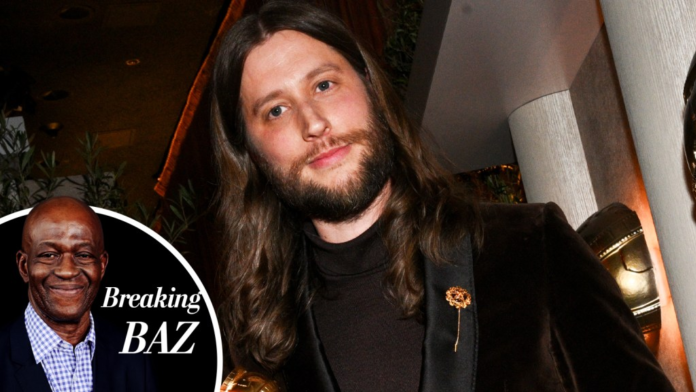Christopher Nolan has told me that composer Ludwig Göransson’s score for the Golden Globe-winning Oppenheimer is “part of the DNA of the project.”
The five-time Oscar-nominated filmmaker explains that music “isn’t something that we hastily add after we’ve shot the film.” It is, rather, an integral part of his movie-making process, “the secret sauce,” he adds.
Göransson and Nolan began discussing the music before the screenplay was completed “so that I can use Ludwig’s music even as I’m shooting,” he explains.
In fact, Göransson notes that he had created something like “two to three hours of music” before Nolan’s cameras rolled.
Ludwig Goransson Mega
“It was hours and hours, and months and months of experimenting, and we started early,” he says. “I was able to write music based solely on conversations Chris and I had, and from reading the script at different stages of its evolution.” The Swedish-born composer spoke to me as he prepared to see his music performed at the splendid Royce Hall on the UCLA campus on Wednesday night.
Göransson explains that he and conductor Anthony Parnther spent several months arranging the music for the live concert performed by 55 musicians – most of them violinists, all of whom worked on the movie – in the hall that’s modelled in the Romanesque-style after Milan’s Basilica di Sant’Ambrogio.
The concert was backed by Universal Pictures, and several executives were in attendance including Donna Langley, Chairman of Universal Pictures and Universal Filmed Entertainment Group and Chief Content Officer.
There were moments of sheer ecstasy as the violins’ timbre vibrato soared throughout the hall (the venue’s acoustics are legendary). The film was shown as Parnther conducted the assembly of strings and even though I’ve seen it three times, it felt as if one was watching it afresh, such was the heightened intensity of having the score played live.
Ludwig Göransson, Christopher Nolan and Cillian Murphy at Royce Hall. Photo Baz Bamigboye/Deadline.
Göransson laughs as he speaks of coming to terms with mathematics and theory “and space and molecules and how you combine that with the emotional core of Robert Oppenheimer’s journey.”
He says that the score’s “beating heart” is hexatonic, “a six-note music scale that creates Oppenheimer’s own theme.”
Göransson explains that his score features many manipulated sound design elements, “like we took the footsteps in the film and amplified them, the sound of the Geiger counter was used, we captured nuclear radioactive sound. There’s a moment where you see the bomb for the first time and you hear these ticking noises, these are all those sound elements I’ve described, turned into music. We’re creating a unique sound,” the composer says.
But it is no doubt stunning, however, to then orchestrate those unique sounds for more than 50 violins.
Nolan, 53, jokes that he’s been making movies since he was seven years old, and all the movie knowledge he’s accumulated over that period has gone into Oppenheimer. It certainly seemed that “every aspect of filmmaking from every department” at the highest level was on display at Royce Hall. Clearly moved, Nolan tells me that “the response to this film has been beyond anything we’ve expected.“
He says the most gratifying thing for him was Cillian Murphy’s titular portrayal. Oppenheimer is the sixth film they’ve collaborated on. The other roles were supporting but now “Cillian’s front and center -now he gets to lead, at last,” Nolan crows.
Nolan acknowledges that Oppenheimer captures “a complicated story and a complicated legacy, and I was drawn to the tension between his sense of obligation and duty to his country and the heroism — and the betrayal he endured. It’s a story for our our times, for any time, a remarkable set of events that he was involved in – a prism through which to view a large movement of 20th century history.
Chatting to Cillian
When I chat with Murphy, he says he didn’t view a frame of the movie during production so that “the first time I saw the movie I was completely overwhelmed and the music that accompanies me — my motif, Oppenheimer’s motif — was incredibly moving.”
Conductor Anthony Parnther with Ludwig Göransson with the Los Angeles Film orchestra. (Baz Bamigboye/Deadline)
However, he admits that the “fact that he was this real life, iconic, divisive 20th century icon added a bit of pressure” and “I don’t think I could have done it with anyone other than Chris because it feels to me a culmination of 20 years working together.”
“We have really established this meaningful level of trust between each other and there are things Chris can push towards that I don’t think I would be open to with another director,” he says.
I ask if he has the stamina, the energy, to endure the endless travel, criss-crossing continents for awards season?
Like Rocky, he quips, “Do I have the stamina?”
He adds: “I have no choice. Listen, there are worse things to be doing, we’re just celebrating the movie, we couldn’t do it for so long because we were on strike and now it feels like a celebration. It was one of the most special jobs I’ve ever done and to have it become this critical and box-office phenomenon, I’m just very heartened for cinema that a three-hour, R-rated movie about a physicist has connected in such a way as it has.”
“I lead a very quiet life. I love the work but not the hoopla, neither does Chris, we share that. If people want to celebrate the film – and it’s your peers and it’s the industry – then that’s very important, and it’s humbling. And it’s very humbling when a film is received like this.”
Murphy also confirms that he and Anatomy of a Fall director Justine Triet are keen to collaborate. “I would love to work with her and Anatomy of a Fall is one of my favorite movies of the year. I think she’s so good,” the actor says.


